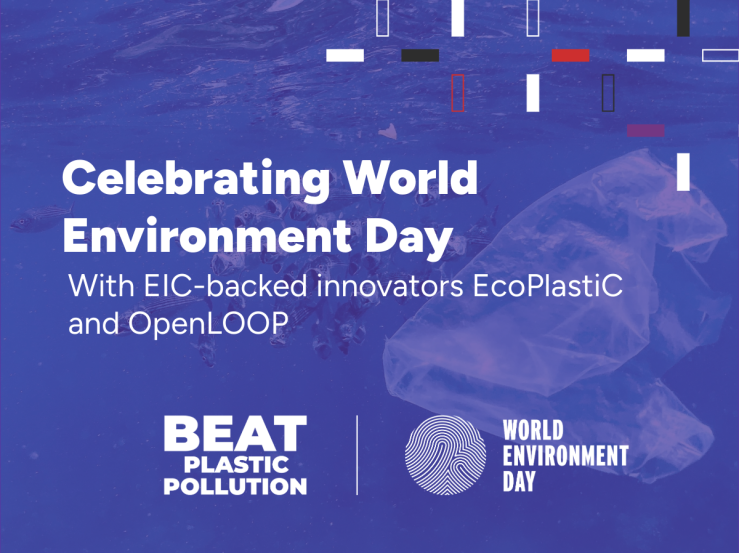More than 400 million tonnes of plastic is produced each year, of which only 1.2% has been recycled and is still in use. Echoing the UNEP-led call, ‘Beat Plastic Pollution’, the 2025 World Environment Day represents a unique occasion to look into future solutions capable of transforming the way plastic waste is managed.
In this regard, the innovative recycling technologies developed within the EIC Pathfinder project, EcoPlastiC, and within the EIC Accelerator Blended Finance project, OpenLOOP, are particularly inspiring given their dual aim of benefitting the environment and valorising currently non-recyclable materials.
EcoPlastiC (Ireland): A circular approach to plastic recycling
Led by the Technological University of the Shannon: Midlands Midwest (TUS) in Ireland, the EIC EcoPlastiC project emerged from the growing need to convert unrecyclable Polyethylene terephthalate (PET) – used extensively in single-use packaging and beverage bottles as well as in the textiles industry – into bioplastics.
The technology developed by the interdisciplinary EcoPlastiC project team embodies the regenerative zero waste approach found in nature, where post-use materials become the ingredients for new products, with unlimited cyclical use of materials.
The change in way of recycling proposed by the project from the current linear to a circular approach to plastics will enable a significant reduction in carbon footprint. Additionally, in the long term, the team envisions the process to be applicable to any plastic material such as multilayer packaging (including PET, PE, PP and barrier layers such as EVOH, PA, metallized films) and flexible films that cannot currently be recycled cost-effectively.
Tackling plastic pollution by educating on the next-generation bioplastics
In January 2025 the EcoPlastiC team took an active part in the ToyStories project – an innovative initiative funded by the Irish Research Council aimed at raising awareness about plastic pollution and its impact on the environment by engaging over 400 children across Ireland and over 150 across Serbia.
In Serbia the researchers of the Institute of Molecular Genetics and Genetic Engineering – EcoPlastiC project partners – played a key role in delivering interactive sessions that educated students from four schools in Novi Sad, Kragujevac, Požarevac and Vranje (Serbia) on plastic pollution, sustainability, and innovative solutions to environmental challenges, further broadening the project's impact in pioneering the future transformation of the plastics industry.
OpenLOOP (Slovenia): Creating value from plastics’ recycling
Plastic pollution is bad for the environment and hinders its adaptation to climate change. The Slovenia-based dedicated team of the Institute of Environmental Protection and Sensors (IOS) coordinating the EIC OpenLOOP project is well aware of this and, to tackle the issue, it is delivering a novel chemical recycling technology capable of effectively degrading Polyethylene terephthalate (PET) and cellulose waste and of creating valuable feedstock in the process.
By combining knowledge from the ecology and engineering fields, the EIC-backed OpenLOOP team aims to redefine industry standards for plastic reuse. Ultimately, the project aims to develop the technology and integrate it into industrial settings.
The project has already announced its first letter of intent with a Slovenian waste collection company, which is committed to investing in the technology by constructing the first industrial facility. Preparations are currently underway to secure the necessary permits, demonstrating the project's potential impact. The goal is to industrialise OpenLOOP between 2026 and 2028, depending on the time required to obtain the necessary permits. To achieve this target, the team is working on optimising and automating processes to ensure competitive market pricing for their secondary raw materials.
Developing environmentally friendly solutions for a higher quality of life
During the first year of the OpenLOOP project, the team achieved significant progress by optimising and automating key processes. Building on their existing recycling methods, they focused on improving pre-treatment techniques to effectively remove dyes and auxiliaries. In parallel, the project established reliable post-treatment processes that consistently produce high-quality outputs — namely, rTA with a minimum purity of 97% and 5HMF at 99%. Indeed, driven by the willingness to develop innovative and environmentally friendly solutions, IOS won several awards, including the Saubermacher Environmental Award 2017. As anticipated, the project will now focus on the sale of its innovative technology with the aim of becoming a recognisable provider in individual sectors in the global market.
About EcoPlastiC
EcoPlastiC, led by the Technological University of the Shannon: Midlands Midwest (TUS) is a Horizon Europe project aimed at the development of novel technologies that convert mixed plastic waste into high-performance biopolymers that can be perpetually recycled. Backed by the EIC Pathfinder, EcoPlastiC is delivering a radically new approach for perpetual plastics recycling.
Learn more about EcoPlastiC by visiting the Horizon Europe database and the company’s official website.
About OpenLOOP
OpenLOOP, coordinated by the Institute of Environmental Protection and Sensors (IOS), is an EU-funded project aimed at delivering a novel chemical recycling technology that can be used to degrade any mixture and blend of PET plastic and cellulose waste. Supported by the EIC Accelerator Blended Finance, the project intends to mature the technology and integrate it into the industrial environment.
Learn more about OpenLOOP on the IOS company website and through the Horizon Europe database.

DISCLAIMER: This information is provided in the interest of knowledge sharing and should not be interpreted as the official view of the European Commission, or any other organisation.

